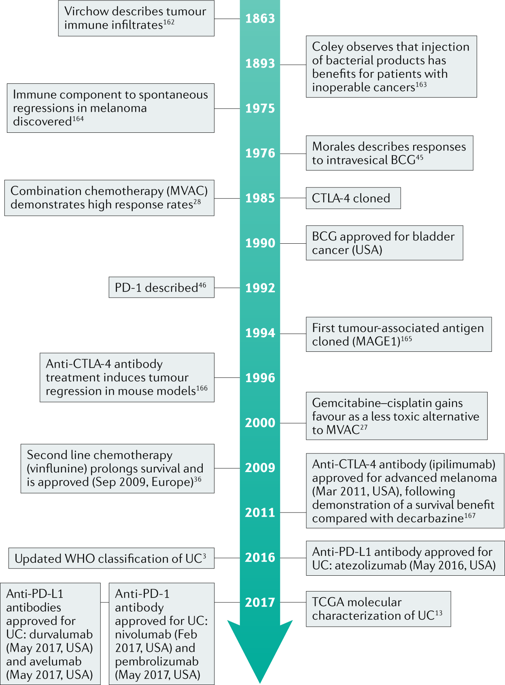当前位置:
X-MOL 学术
›
Nat. Rev. Urol.
›
论文详情
Our official English website, www.x-mol.net, welcomes your
feedback! (Note: you will need to create a separate account there.)
Molecular and histopathology directed therapy for advanced bladder cancer.
Nature Reviews Urology ( IF 12.1 ) Pub Date : 2019-07-09 , DOI: 10.1038/s41585-019-0208-0 Constantine Alifrangis 1 , Ursula McGovern 1 , Alex Freeman 2 , Thomas Powles 3 , Mark Linch 1, 4
Nature Reviews Urology ( IF 12.1 ) Pub Date : 2019-07-09 , DOI: 10.1038/s41585-019-0208-0 Constantine Alifrangis 1 , Ursula McGovern 1 , Alex Freeman 2 , Thomas Powles 3 , Mark Linch 1, 4
Affiliation

|
Bladder cancer is a heterogeneous group of tumours with at least 40 histological subgroups. Patients with localized disease can be cured with surgical resection or radiotherapy, but such curative options are limited in the setting of recurrent disease or distant spread, in which case systemic therapy is used to control disease and palliate symptoms. Cytotoxic chemotherapy has been the mainstay of treatment for advanced bladder cancer, but high-quality evidence is lacking to inform the management of rare subgroups that are often excluded from studies. Advances in molecular pathology, the development of targeted therapies and the resurgence of immunotherapy have led to the reclassification of bladder cancer subgroups and rigorous efforts to define predictive biomarkers for cancer therapies. In this Review, we present the current evidence for the management of conventional, variant and divergent urothelial cancer subtypes, as well as non-urothelial bladder cancers, and discuss how the integration of genomic, transcriptomic and proteomic characterization of bladder cancer could guide future therapies.
中文翻译:

晚期膀胱癌的分子和组织病理学指导治疗。
膀胱癌是一组异质性肿瘤,至少有 40 个组织学亚组。局部疾病患者可以通过手术切除或放疗治愈,但这种治疗选择仅限于复发性疾病或远处扩散的情况,在这种情况下,全身治疗用于控制疾病和缓解症状。细胞毒性化疗一直是晚期膀胱癌的主要治疗方法,但缺乏高质量的证据来指导经常被排除在研究之外的罕见亚组的管理。分子病理学的进步、靶向治疗的发展和免疫治疗的复兴导致膀胱癌亚组的重新分类和为癌症治疗定义预测性生物标志物的严格努力。在这篇评论中,
更新日期:2019-11-18
中文翻译:

晚期膀胱癌的分子和组织病理学指导治疗。
膀胱癌是一组异质性肿瘤,至少有 40 个组织学亚组。局部疾病患者可以通过手术切除或放疗治愈,但这种治疗选择仅限于复发性疾病或远处扩散的情况,在这种情况下,全身治疗用于控制疾病和缓解症状。细胞毒性化疗一直是晚期膀胱癌的主要治疗方法,但缺乏高质量的证据来指导经常被排除在研究之外的罕见亚组的管理。分子病理学的进步、靶向治疗的发展和免疫治疗的复兴导致膀胱癌亚组的重新分类和为癌症治疗定义预测性生物标志物的严格努力。在这篇评论中,











































 京公网安备 11010802027423号
京公网安备 11010802027423号